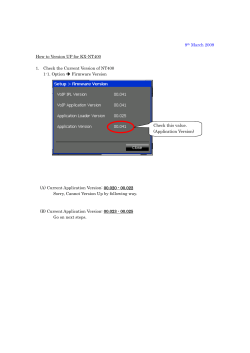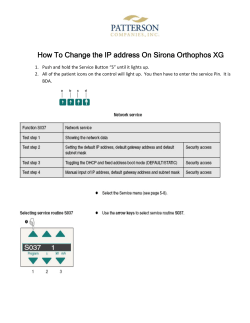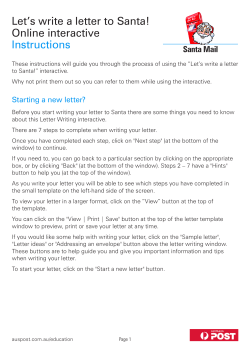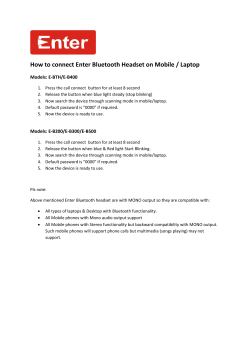
CCI NetEditor: A How-to Guide
CCI NetEditor: A How-to Guide Table of Contents 1. Getting Started 2. The Editor Full Screen Preview Search Check Spelling Clipboard: Cut, Copy, and Paste Undo / Redo Foreground Color Background Color Bookmark Hyperlink Image Insert Table Edit Table / Cell Show / Hide Guidelines Special Characters Line Remove Formatting View / Edit Source Style Selector Basic Text Formatting Line Breaks 3. Asset Manager Getting Started The NetEditor is a simple, dynamic, automatic way of publishing your site to the web. Through our web interface, you can manage content, links, files, and images just like you would in a word processing application. All new content being added to your site should be entered directly into this interface. Please do not copy content from MS Word or other similar program into the admin interface. We recommended using a text editor like WordPad or NotePadsomething that does not format text. The content editor used in NetEditor is only supported on Internet Explorer 5.0 or higher. The Editor When you are adding or editing a page, you will be taken to an area where you can edit the content on the front page of your site. There is a content box where you can enter text for the page, and formatting tools above it where you can change the appearance of the text. The following is a walk through each button (from left to right) and a description on how they function. FULL SCREEN To edit your site in full screen mode, click this button. To return to the smaller editor window, click the button again. PREVIEW To preview your site in different screen resolutions, click this button. You can choose from 640x480 pixels, 800x600 pixels, or 1024x768 pixels. SEARCH To search the text in the content screen, click this button. Here you can search for text, or search and replace portions of text- much like in a word processing program. CLIPBOARD: COPY & PASTE The next four buttons are Cut, Copy, Paste, and Paste From Word. These function just like they would in a word processing program. ‘Paste’ should be used for plain text only. The ‘Paste From Word’ button will paste the contents of the clipboard properly by converting Word formatting to HTML formatting. UNDO/REDO You can use these toolbar buttons to undo mistakes. Using the undo button will go backwards; using the redo button will go forward. FOREGROUND COLOR This tool allows you to choose the text color. Highlight the text you would like to change, and then click on the ‘Foreground Color’ button. You will see a palette with various color choices. Click on the color you would like. BACKGROUND COLOR Much like ‘Foreground Color’, this button also includes a color palette. The color will be applied to the background area of the text you have selected. Highlight/select the text you would like to change, and then click on the ‘Background Color’ button. You will see a palette with various color choices. Click on the color you would like. To remove a background color, click the ‘x’ on the palette. BOOKMARK If you would like to add a bookmark to your page, place the cursor where you want the bookmark to go. Click the ‘Bookmark’ button and enter a name for the bookmark. Click ‘Insert’ and then ‘OK’. To link to your bookmark on the page, see ‘Hyperlink’ (below). HYPERLINK To add a link in your page, highlight the text that you want to make ‘clickable’. A dialog window will appear with several options. OPTION: ‘Source’: 1. For internal links (ie- links to files or other pages on your site), select the blank value. 2. For external links, select ‘http://’ 3. For email links, select ‘mailto://’ Enter the URL or filename in the second box after ‘Source’. To upload a file, click on the folder. This will display your ‘Asset Manager’- all of the files you have uploaded and have available for use on your site. For more information on the ‘Asset Manager’, read the section below called ‘Asset Manager’. Click on a filename on the right. (If the file is an image, a preview will appear on the left.) When you have selected the file to link to, click ‘Use File’. You may choose to enter a ‘Target’ for your link (or leave blank for default) or a ‘Title’ (a short description of the link). Once you have filled in the information, click ‘Insert’ to create your link. Click ‘OK’ to complete this step. To edit a link: Click on the link text in the content area, and then click on the ‘HYPERLINK’ button on the toolbar. This will open the link edit window once again. Follow the steps above to edit the link information. IMAGE To place an image into your page, position the cursor where you would like the image to be. Click on the ‘Image’ button on the toolbar. A dialog window will appear with image options. Click on the folder to choose an image. This will open the ‘Asset Manager’. For details on using this area, read the section titled ‘Asset Manager’ below. Here you can choose an image or upload a new one. Once you choose an image for the page, you can also enter a title, alignment properties, border style, width & height, and spacing. When you have entered all of the appropriate information, click ‘insert’. The image should appear in your content. Please be sure that your image is not too large for your page. A good image size for the web is less than 500 pixels in width or height. You can use any basic image editing software to resize your images before uploading them to your site. INSERT TABLE Click this button to insert a table into your page. A ‘grid’ will appear: Use your cursor to ‘draw’ the table cells you’d like. Click and drag your mouse to highlight the cells you’d like to include in the table. Release the mouse button, and your table should appear in the editor. You can then enter text and images as you normally would into each cell. To show or hide the gridlines in your table (for tables with a border of ‘zero’), click on the ‘Show/Hide Guidelines’ button. If you want to create an advanced table, click on ‘Advanced’ at the bottom of the grid that appears under ‘Insert Table’. Advanced Table Insert Use this window to make custom selections for inserting your table. When you are finished, click ‘Insert’. To edit a table’s properties once it is created, click in a table cell, and then click on the ‘Edit Table/Cell’ button. You will have 3 options: Table Size, Edit Table, or Edit Cell. Table Size Use the buttons in this window to make changes to the rows and columns in your table. Edit Table In this window, you can make changes to your table’s width, height (under the ‘AutoFit’ tab), alignment, margins, borders, and spacing (under the ‘Properties’ tab), or custom styling using Cascading Style Sheets (under the ‘Style’ tab). To save your changes in this window, click ‘Apply’ and then ‘OK’. SPECIAL CHARACTERS To insert a special character into your page, click on the button for ‘Special Characters’ button. Then click on the character you would like to insert, and it will appear in your text. HORIZONTAL RULE To place a horizontal rule on your page, simply position the cursor where you’d like the rule to go, and click on the button labeled ‘Horizontal Rule’. REMOVE FORMATTING To remove all formatting from text, click on the eraser button. The text should then appear normal. VIEW SOURCE CODE To view the HTML source code of your document, click on this button. If you’d like to make changes, you can make them here. To save your changes, click ‘Apply’ and then ‘OK’. STYLE SELECTOR To apply any Custom Cascading Style Sheets styles to your text, click on the button ‘Style Selection’. A side pane will appear on the right of the content window, displaying the styles you have to choose from. Highlight the text you would like to change, and click on the style. When you are finished choosing styles, click on the ‘x’ at the corner of the Styles Pane. BASIC TEXT FORMATTING The second row of buttons includes tools for basic text formatting. These tools can be used simply by highlighting the text of interest and clicking on the formatting button. A list of the options is below: Paragraph Font Name Font Size Bold Text Italic Text UnderlinedText Align Left Align Center Align Right Align Justify Ordered List Bulleted List Decrease Indent Increase Indent LINE BREAKS To enter a double-line break (for example: two spaces between paragraphs), simply press 'Enter'. To enter a single-line break, press 'Shift+Enter'. ASSET MANAGER The Asset Manager helps you organize and control the files you have on your site. You can upload images and documents here. To access your manager, click on ‘Insert Image’ or ‘Hyperlink’. Then click on the folder next to ‘Source’ to view the manager. This will display your files in a list on the right side of the screen. If you click on the filename on the right, a preview (if the file is an image) will appear on the left. You can then click on ‘Use File’ to insert the file as a link or an image on your page. To upload a new file, click on ‘Browse’ and navigate to the file on your hard drive. Click ‘Open’ and then ‘Upload’. The file should then appear in the list on the right. To delete a file from your list, click ‘del’. To download a file directly from your list, click on the arrow icon next to the filename. You can also create new folders in your Asset Manager. Click on ‘New Folder’. Type the name of your folder and click ‘Create’. Then click ‘Close and Refresh’. You should now be able to view the contents of this new folder by selecting it from the drop-down menu in the upper-left corner (next to the ‘New Folder’ button) To delete a folder, view the contents and click ‘Del Folder’.
© Copyright 2025










